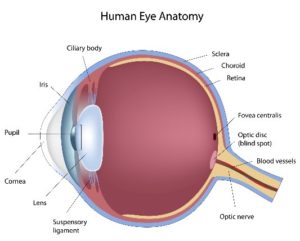Epiretinal Membrane Treatment in Baltimore
Also serving Pikesville, Owings Mills, Glen Burnie, & Rosedale
 Epiretinal membranes, also known as macular puckers, are a complication affecting the macula, the center part of the retina responsible for clear central vision and capturing fine detail (e.g., small print). Most epiretinal membranes cause no noticeable symptoms. But when an epiretinal membrane does distort vision, Drs. Elman and Schechet at the Elman Retina Group offer complete treatment intervention.
Epiretinal membranes, also known as macular puckers, are a complication affecting the macula, the center part of the retina responsible for clear central vision and capturing fine detail (e.g., small print). Most epiretinal membranes cause no noticeable symptoms. But when an epiretinal membrane does distort vision, Drs. Elman and Schechet at the Elman Retina Group offer complete treatment intervention.
What Is an Epiretinal Membrane?
An epiretinal membrane is a thin layer of scar tissue that forms over the surface of the macula. Normally, the macula lies flat against the back wall of the eye. But as the scar tissue forms, it can cause the macula to contract and wrinkle (or pucker).
Many cases of epiretinal membranes or macular puckers do not cause any symptoms. Vision remains the same or nearly the same. However, some macular puckers cause thickening and wrinkling of the retina resulting in changes to vision. Individuals with macular puckers may notice that lines or shapes that should look straight, like a door frame, instead appear wavy or crooked in the affected eye (the other eye may see normally). Only a fraction of cases affect both eyes. In rare cases of macular pucker, symptoms like double vision or sensitivity to light can occur. Sometimes images may look larger or smaller than they actually are.
What Causes an Epiretinal Membrane to Form?
 Most epiretinal membranes are related to a deterioration of the vitreous humor, which is the jelly-like substance that fills the center of the eye. With age, the vitreous can shrink and start to tug on the retina — the layer of light-sensitive tissue lining the back of the eye. This causes scar tissue to develop on the retinal surface, resulting in the wrinkling or puckering of the retinal tissue.
Most epiretinal membranes are related to a deterioration of the vitreous humor, which is the jelly-like substance that fills the center of the eye. With age, the vitreous can shrink and start to tug on the retina — the layer of light-sensitive tissue lining the back of the eye. This causes scar tissue to develop on the retinal surface, resulting in the wrinkling or puckering of the retinal tissue.
Epiretinal membranes have been linked to other complications in the retina, including retinal tears, diabetic retinopathy, retinal detachment, inflammation and trauma to the eye.
Diagnosis and Treatment of Epiretinal Membranes
Epiretinal membranes are diagnosed through a dilated eye exam. An imaging test called coherence tomography (OCT) may be performed to scan the retina and identify the presence and extent of scar tissue. Another test, called a fluorescein angiogram, uses a special vegetable-based dye that is injected into a hand vein. This test looks at the circulation in the retina, and may be performed to look for other retinal problems that may have contributed to the macular pucker.
Once an epiretinal membrane has been diagnosed, associated swelling or leakage in the retina can sometimes be treated with eyedrops or other ocular medications. Depending on the degree of symptoms and vision loss, Drs. Elman and Schechet may treat epiretinal membranes or macular puckers with a surgical procedure called a vitrectomy.
During vitrectomy, which usually is sutureless, the surgeon makes three tiny, self-sealing incisions in the eye. Next, our doctors remove the vitreous humor, which is replaced with saline. Removing the vitreous gel enables us to safely reach and remove the membrane wrinkling the surface of the retina. As with cataract operations, vitreous surgery typically is performed under “twilight sleep” as an outpatient procedure.
Vitrectomy Recovery and Outlook
Dr. Elman and Dr. Schechet will explain in detail what you can expect after vitrectomy. An eye shield will be placed temporarily over the treated eye and medicated eye drops should be used to help your eye heal. Our doctors will follow up with you throughout recovery to ensure your eye and retina heal properly and to answer any questions you have.
Common aftereffects of surgery include temporary eyelid swelling, bruising around the eyes and eye redness. Some patients notice blurry vision or feel as though something is stuck in the eye for a few days after surgery. Severe pain and other adverse aftereffects are unusual and should be reported to our doctors promptly.
You can read, watch television and do light housework as your eye and retina heal. You should refrain from straining and lifting heavy objects and avoid dusty or windy environments to prevent an eye infection. You will likely be able to resume work about a week after vitrectomy surgery.
Thanks to advanced techniques and technology, vitrectomy surgery is a safe procedure and complications are rare. The outcomes in most cases are very good, with vision gradually improving in the months following surgery as the retina and eye heal.
Frequently Asked Questions About Epiretinal Membrane and Vitrectomy
How does an epiretinal membrane affect vision?
Epiretinal membranes may cause mild symptoms or no symptoms at all. In severe cases they can cause objects to appear blurry or distorted or straight lines to appear wavy.
What should I do if I suspect a problem with my retina?
If you are experiencing blurry vision or notice that straight lines appear wavy, you should have your eyes examined by Dr. Elman or Dr. Schechet. The doctor will inquire about your symptoms and medical history and perform some tests to confirm or rule out an epiretinal membrane.
Is there any way to prevent an epiretinal membrane?
There is no way to prevent an epiretinal membrane. Some epiretinal membranes are linked to underlying diabetic eye disease. If you have diabetes, keeping it under control may reduce the risk of developing an epiretinal membrane.
The best defense against epiretinal membranes is regular eye examinations to look for any changes to your eye anatomy or vision.
Are all epiretinal membranes treated with surgery?
No, surgery is only recommended for a small percentage of cases of epiretinal membrane. If you have an epiretinal membrane that is causing significant visual distortion and interfering with your quality of life, surgery may be an appropriate solution. Drs. Elman and Schechet can recommend your best options based on a comprehensive evaluation and testing.
Is vitrectomy for the treatment of an epiretinal membrane painful?
No, anesthesia is administered prior to surgery to prevent you from experiencing any pain. You will be permitted to go home shortly after surgery. (An adult will need to drive you home.) Post-operative discomfort can be managed with prescription or over-the-counter medication.
Are there any risks of vitrectomy?
All surgeries carry some degree of risk, but those risks are minimized when the procedure is performed by a qualified, experienced doctor. Vitrectomy risks include infection, bleeding, retinal tear and detachment. Vitrectomy can also accelerate the development of cataracts in patients who have not yet had cataracts. If you have had cataract surgery, vitrectomy will not have any adverse effects on your intraocular lens.
Contact Elman Retina Group
If you are experiencing any changes in your central vision or are unable to see small print or recognize faces, you should be evaluated by our ophthalmologists and team. Please contact the Elman Retina Group today to make an appointment.



